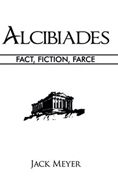
 |
The ancient ruler of Israel, King Solomon, once famously wrote in the Book of Ecclesiastes that "there is nothing new under the sun." Although new technologies and cultural norms continue to alter our world, the core truth of the statement as it applies to the human condition is still evidenced in societies today. Meyer seems to recognize this fact as he uses the life of Alcibiades and the cultural milieu of his day to help shed some light on current American foreign policy. The result is a tale that while frequently humorous is also informative and thought-provoking.
History remembers Alcibiades as a clever and innovative statesman and general who was also self-seeking and unscrupulous. Meyer manages to capture much of what is known of his protagonist's personality, along with the major events of his life, but enhances them with both fictional encounters and a heavy dose of farce. However, the trials and triumphs of Alcibiades, while forming much of the framework of the book, mainly allow for the presence of a more serious contemporary, Socrates, who offers up food for thought on how a nation like America interacts with the rest of the world. Of course, to maintain farcical consistency and throw in some political satire Socrates' spotlight is shared at times by other characters such as a wandering Siddhartha and a trio of "aliens" from a distant land mass called Hudsonia that was once ruled by the warmongering Bushwacker the Second.
Meyer's book comes across in many ways like a collaboration between Thucydides and the writers of Mad magazine. Yet just as Monty Python's Life of Brian had a serious message hidden underneath its antics, this novel also has some important political commentary that deserves a hearing.